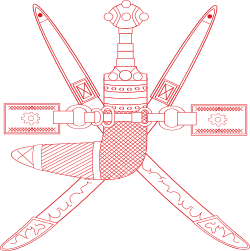Politics of Oman
 |
| This article is part of a series on the politics and government of Oman |
Politics of Oman takes place in a framework of an absolute monarchy whereby the Sultan of Oman is not only head of state, but also the head of government. Chief of state and government is the hereditary sultan, Qaboos bin Said al Said, who appoints a cabinet to assist him. Sultan Qaboos also serves as supreme commander of the armed forces, prime minister, and minister of defense, foreign affairs, and finance.
The Monarchy
The Sultan is a direct descendant of Usman Sa'id bin Sultan, who first opened relations with the United States in 1833. The Sultanate has neither political parties nor legislature, although the bicameral representative bodies provide the government with advice. The present Sultan has no direct heir, and has not publicly designated a successor. Instead, the ruling family should unanimously designate a new Sultan after his death. If they do not designate a new ruler after three days, then they open a letter left to them by the deceased Sultan, containing a recommendation for a new Sultan.
Current Sultan of Oman, His Majesty Sultan Qaboos bin Sa’id Al ‘Bu Sa’id holds an extraordinary amount of power. Along with his position as Sultan, he is prime minister, defense minister, finance minister, foreign affairs minister and chair of the central bank. Moreover, Qaboos has only a few family members in his cabinet and the offices they hold are considered quite powerless. His cousin Haythim for example, is minister of national heritage and culture while his uncle, Shabib is special advisor for environmental affairs. This style of governance has implications as none of his family members have acquired the necessary administrative skills to rule Oman after Qaboos death.[1]
Judicial system
The court system in Oman is regulated by Royal Decree 90/99. There are three court levels in Oman, the Elementary Court is the lowest court, followed by the Court of Appeal, and then the Supreme Court as the highest court in the country.
In addition to this there is an Administrative Court that looks into cases made against the government.
Administrative divisions
Administratively, the populated regions are divided into 59 districts (wilayats), presided over by governors (walis) responsible for settling local disputes, collecting taxes, and maintaining peace. Most wilayats are small; an exception is the wilayat of Dhofar, which comprises the whole province. The wali of Dhofar is an important government figure, holding cabinet rank, while other walis operate under the guidance of the Ministry of Interior.
The Consultative Council
In November 1991, Sultan Qaboos replaced the 10-year-old State Consultative Council with the Consultative Assembly (Majlis al-Shura) to systematize and broaden public participation in government. The Assembly has 84 elected members and exercise some legislative powers. Representatives were chosen in the following manner: Local caucuses in each of the 59 districts sent forward the names of three nominees, whose credentials were reviewed by a cabinet committee. These names were then forwarded to the Sultan, who made the final selection. The Consultative Assembly serves as a conduit of information between the people and the government ministries. It is empowered to review drafts of economic and social legislation prepared by service ministries, such as communications and housing, and to provide recommendations. Service ministers also may be summoned before the Majlis to respond to representatives' questions. It has no authority in the areas of foreign affairs, defense, security, and finances. The Council of State (Majlis al-Dawla) has 83 appointed members including 14 women.
Political parties and elections
Oman does not allow political parties and only holds elections with expanding suffrage for a consultative assembly. Though Oman is developing into a constitutional monarchy, political parties are not yet allowed in Oman. The previously influential opposition movement, the Popular Front for the Liberation of Oman, is dormant today. The last elections were held on 15 October 2011.
| Members | Seats |
|---|---|
| Elected non-partisans | 84 |
| Total (turnout %) | 84 |
International organization participation
Oman participates in ABEDA, AFESD, AL, AMF, ESCWA, FAO, G-77, GCC, IAEA, IBRD, ICAO, IDA, IDB, IFAD, IFC, IHO, ILO, IMF, IMO, Inmarsat, Intelsat, Interpol, IOC, ISO (correspondent), ITU, NAM, OIC, OPCW, United Nations, UNCTAD, UNESCO, UNIDO, UPU, WFTU, WHO, WIPO, WMO, WTrO.
Notes and references
- ↑ Katz, Mark. "Assessing the Political Stability of Oman." Middle East Review of International Affairs Volume 8, No. 3, September 2004
External links
- Government of Oman at the Ministry of Information, Sultanate of Oman
- Oman from the CIA's Chiefs of State and Cabinet Members list
- Omani Ministry of Foreign Affairs
- Tawasul - Empowerment of Civil Society in Oman
- Adam Carr's Election Archive
- Oman Government at DMOZ